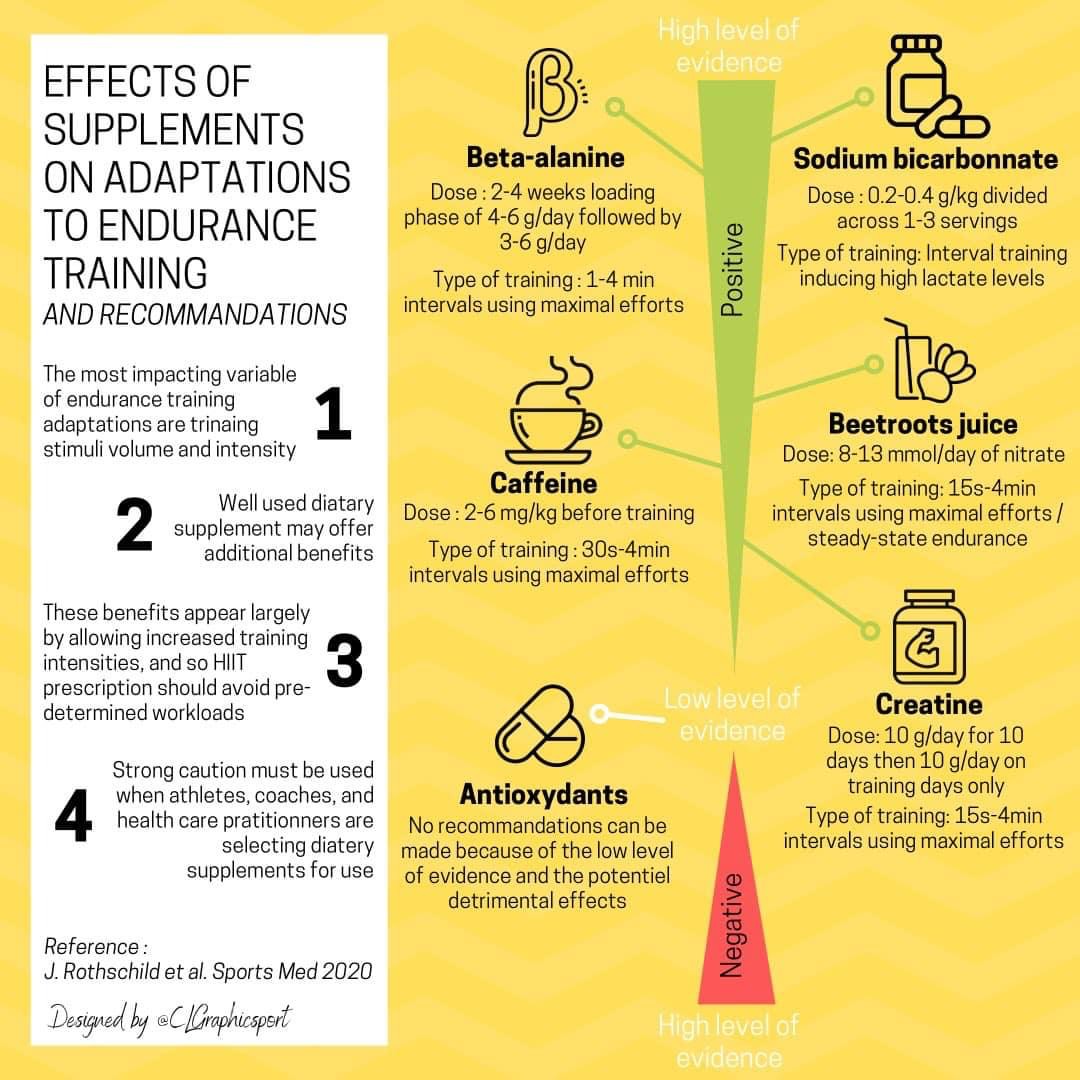Endurance training leads to various cellular and systemic adaptations aimed at minimizing disruptions in the body’s internal environment caused by exercise. These adaptations are influenced differently by the volume, intensity, and training status, as well as dietary choices that can either enhance or impair the response to training.
Many different supplements have been studied for their potential to enhance performance, but the effects of continuous supplement intake alongside endurance training are not as well understood. For example, supplements like sodium bicarbonate (baking soda) and beta-alanine may improve endurance performance and potentially adaptation to endurance training by affecting buffering capacity and/or allowing for increased training intensity. On the other hand, antioxidants such as vitamin C and vitamin E may impair adaptation to training by blunting cellular signaling but have minimal impact on outcomes.
Additionally, there is limited data suggesting the potential of dietary nitrates (in the form of beetroot juice), creatine, and possibly caffeine to further enhance adaptation to endurance training.
The goal of the review published in the Sports Medicine journal is to examine the influence of dietary supplements on metabolic and physiological adaptations to endurance training.
Buffering Agents (Sodium Bicarbonate and Beta-Alanine)
In addition to increasing training intensity, supplements acting as pH buffers can also influence the response to exercise by affecting key signaling molecules influenced by pH changes. Research on the use of these supplements during endurance training either shows additional benefits or no differences between groups. The type of training where such supplements may provide the most benefit is 1-4 minute intervals with maximum efforts, rather than pre-determined speed-based training that should be sufficient to elevate blood lactate and/or pH compared to the same training without supplements.
Dietary Nitrates (Beetroot Juice)
Dietary nitrates, typically in the form of beetroot juice, can enhance endurance due to their ability to increase nitrite and nitric oxide levels in the bloodstream. The benefits manifest through various mechanisms related to oxygen efficiency, workout intensity, and muscle function. Nitrates can improve adaptation to high-intensity training and endurance workouts. While the term “dietary nitrates” is often used interchangeably with beetroot juice, nitrates are just one component of beetroot juice, and studies using beetroot juice often show greater benefits compared to nitrate salts. The type of training that benefits from nitrate intake includes intervals of 15 seconds to 4 minutes with maximal efforts, rather than training at a predetermined speed. It’s important to note that commercially available products can vary significantly in nitrate content. For instance, the effects of beetroot juice were not observed after 6 weeks of training with an intake of approximately 5 mmol of nitrate per day, whereas studies using 8-13 mmol of nitrate per day showed a positive effect.
Antioxidants
The intake of antioxidants can improve performance and recovery but may also hinder the adaptive response to exercise. Moreover, the term “antioxidant supplement” often includes multiple substances that can have different effects on the body, such as vitamin C, vitamin E, resveratrol, and green tea extract. Studies have shown that high doses of vitamins C and/or E may block some adaptive responses to exercise, but actual performance decreases are rarely observed. This inconsistency between disrupted adaptive responses without performance changes suggests that longer timeframes may be needed before any negative effects of supplement intake become significant.
Caffeine
The most likely way caffeine can enhance adaptation to training is by allowing athletes to accumulate greater training stress due to reduced perception of exercise intensity. Despite limited research on the long-term use of caffeine and its effects on training adaptation, performance in cycling workouts improved independently of the duration of caffeine consumption. Continuous caffeine intake during workouts should not diminish its long-term effects, but additional research is needed in this regard.

